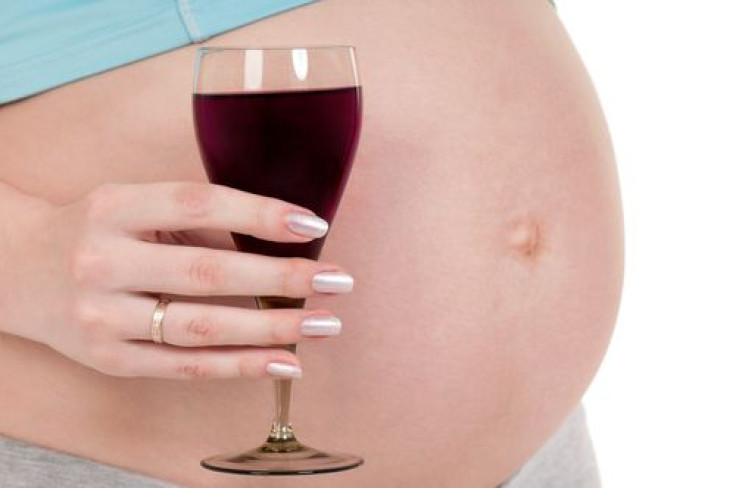Drinking During Pregnancy: Could Consuming Wine While Pregnant Lead To Better Mental Health In Kids?

The conundrum of whether or not to consume alcohol during pregnancy may trouble the minds of expectant mothers. While several scientific studies err on the side of caution and say "a pregnant woman should not touch alcohol at all during her pregnancy," others give an affirming nudge "it is OK to drink a little bit of alcohol during pregnancy." The lack of focus on important psychological factors that influence the effect of alcohol while pregnant may lead to inconclusive findings. According to a recent study, enjoying a glass of wine a week during pregnancy leads to better mental health outcomes for kids by age 7.
The Centers for Disease Control and Prevention (CDC) says when pregnant women drink, their baby drinks, and this can potentially lead to fetal alcohol spectrum disorders (FASDs). The disorder includes a wide range of physical and mental disabilities and lasting emotional and behavioral problems that may not always be easy to identify when a child is a newborn. Although agencies like the CDC report on the possible effects of alcohol on child development, there is still an array of scientific studies that say it's okay for women to indulge in moderate alcohol consumption. A Danish researcher believes the inconsistent findings can be attributed to the lack of focus on many social and economic factors that impact child development.
Published in the journal Alcohol and Alcoholism, Janni Niclasen, psychologist at the University of Cophenhagen, Denmark, conducted a follow-up on the "Danish National Birth Cohort” ("Better Health for Mother and Child"), a large population study that gathered information about alcohol and pregnancy between 1996 and 2002. The study consisted of over 100,000 pregnant Danish women who underwent interviews on three separate occasions related to their alcohol consumption in pregnancy.
The first two interviews were conducted via telephone during the first and second part of the participants’ pregnancy. The Danish women were asked questions about their health, alcohol consumption, smoking habits, medicine intake, and other lifestyle factors, including their socioeconomic status. The participants completed the last interview round when their children were at 18 months and 6 years of age. Lifestyle during the final part of pregnancy, child health, and development questions were asked to the mothers in the last two interviews.
Throughout the course of the study, only 37,000 women successfully answered all three rounds of questions. The participants were contacted again when their children were now seven-years-old to measure their scores on the Strengths and Difficulties Questionnaire (SDQ), a tool utilized for screening children and adolescent’s behavior, emotions, and peer relationships. The questionnaire consisted of 25 questions subdivided into five scales: emotional problems, peer problems, hyperactivity/inattention, conduct disorder, and prosocial behavior, according to the University of Copenhagen’s news release. It is in these SDQ results that Niclasen formulated her thesis and drew her own conclusions on alcohol consumption during pregnancy.
Niclasen only observed the alcohol consumption of women who drank small quantities of alcohol during pregnancy. She found mothers who drink 90 units or more — equivalent to 10 bottles of 12 percent white wine during pregnancy — had children who showed significantly better emotional and behavioral outcomes at age 7, compared to their counterparts. While these results may appear to be illogical, the lifestyle of the mothers may help explain this finding. “Mothers who drank 90 units or more of alcohol turn out to be the most well educated and healthiest lifestyle over all,” said Niclasen. “Further, it is a question of taking account of childhood-related psychological factors like attachment between mother and child in this type of study.”
The findings suggest for future researchers to take into account childhood-related psychological factors like attachment, which is known to be a significant predictor for child cognitive and mental health. “It’s already difficult to control for lifestyle factors, so when there is also data missing that takes account of psychological variables, such as connection to the mother and intelligence, it’s important to be wary when interpreting the results,” she said.
The researcher affirms the findings are not an invitations for pregnant women to go out and drink alcohol, since her study was limited focusing only on women who drank small amounts while pregnant. However, the focus on lifestyle factors may help explain the inconsistencies in studies involving the impact of alcohol on child mental health later in life.
One in 13 pregnant women in the United States drink during pregnancy, with lower levels of education associated with an increased frequency and intensity of binge drinking among all women, according to the CDC. The highest rates of alcohol use among pregnant women occur in those who are between the ages of 35 and 44.
To learn more about alcohol use during pregnancy, click here.
Source: Niclasen J. Drinking or Not Drinking in Pregnancy: The Multiplicity of Confounding Influences. Alcohol and Alcoholism. 2013.



























